第12讲现在完成进行时与现在完成时的辨析 (2)
现在完成时和现在完成进行时的区别27页PPT

56、死去何所道,托体同山阿。 57、春秋多佳日,登高赋新诗。 58、种豆南山下,草盛豆苗稀。晨兴 理荒秽 ,带月 荷锄归 。道狭 草木长 ,夕露 沾我衣 。衣沾 不足惜 ,但使 愿无违 。 59、相见无杂言,但道桑麻长。 60、迢迢新秋夕,亭亭月将圆。
16、业余生活要有意义,不要越轨。——华盛顿 17、一个人即使已登上顶峰,也仍要自强不息。——罗素·贝克 18、最大的挑战和突破在于用人,而用人最大的突破在于信任人。——马云 19、自己活着,就是为了使别人过得更美好。——雷锋 20、要掌握书,莫被书掌握;要为生而读,莫为读而生。——布尔沃
END
现在完成时与现在完成进行时讲解

现在完成时一.基本结构:助动词have/has+过去分词(done) 。
表示过去发生的动作对现在造成的影响,或过去发生的动作还未结束,一直持续到现在或将来,重点在于对现在的影响。
二.句型:否定句:主语+have/has+not+过去分词+其他.一般疑问句:Have/Has+主语+过去分词+其他.简略答语: Yes, 主语+ have/has.(肯定)No, 主语+haven't/hasn't.(否定)三.用法1.表示一个过去发生并结束的动作对现在造成的影响或结果。
这一类情况可以细致分为下述两种情况。
1)表示开始于过去的动作刚刚结束。
常和just,now,already,yet,not…yet等不确定的时间状语连用。
Li Ming has just turned off the light. 李明刚刚把灯关上。
(说明现在灯关上了)I've finished my homework now. 现在我已经做完作业了。
(说明可以交作业或做别的了)2)表示过去动作的结果,一直延续到现在。
一般不用时间状语。
I have lost my pen. 我把笔丢了。
(说明过去某时丢的,现在我还没找到这支笔)She has become a teacher. 她已经当了老师。
(说明她现在仍是老师)2. 表示动作或状态从过去某时开始,持续到现在的动作(用行为动词表示)或状态(be动词表示),常与for(+段时间)、since(+时间点或过去时的句子)连用。
①for+时段(for a long time,for a month)②since+过去一个时间点(译为:自从……以来,如since 1991 、since yesterday)③since+时段+ago (since 2 days ago)④since+从句(过去时)●⑤It is+时段+since+从句(过去时)⑥其它常见:today,this week(month),lately,recently,these days,in the past few days,during the last two weeks,,so far,up to now,till (until)now等。
2023年初中英语时态语法分析之现在完成进行时相关考点

2023年初中英语时态语法分析之现在完成进行时相关考点关于现在完成进行时对于现在完成时和现在完成进行时我有以下疑惑:1.假设我从早上到晚上工作了一天,晚上10点的时候我收工不干了,在11点的时候我跟打电话跟人说:我干了一天活,现在腰酸背痛腿抽筋。
此时我是应该用现在完成时还是现在完成进行时?我是想问:此时用现在完成进行时是错误的吗?原因是:现在完成进行时的持续时间是要持续到说话时刻的(即11点),而10点就不干活了,所以应该用现在完成时,对吗?2.有或者比如“我刚才在看电影,因此没听到你给我打电话”。
此时若用现在完成进行时,是否代看电影的动作恰恰在持续到我说话时,也就是说如果在说话前1小时我就停止看电影了,是不是就不能用现在完成进行时而只能用现在完成时了?但实际生活中,有没有可能出现用现在完成进行时的情况呢?1.I'm exhausted. I've been working all day, but I'm finished now.I'm exhausted. I've worked all day, but I'm finished now.实际并没有硬性的规定,“不久前完成”中的“不久”到底是“多久”,没有规定。
所以尺度全在作者手上。
而你说的10点收工,11点还是累得要死,时间跨度不算大,用现在完成时或现在完成进行时都可以。
重点在:工作一天后产生的后果/结果/影响。
2.解释因为看电视没听到电话响,用过去进行时。
A:Why didn’t you pick up the phone?B: Sorry, I was watching TV.1. 现在完成时强调动作的结果。
所以你用现在完成时,则暗示你收工了,不再干活了。
现在完成进行时强调动作的持续。
所以你用现在完成进行时,则暗示你仍然在干活。
2. 你说的现在完成进行时是否要表示动作持续到你说话的时候,这要看你如何定义这个动作的持续,比如下面的链接中,老板一直承诺加薪,但在我说话的时候,在我说话的那一霎那,老板可能没有说话,但仍然属于动作的持续,所以不能机械的理解何谓“持续”现在完成进行时和现在完成时辨析朗文词典例句:Who's been rooting around in my desk? 谁乱翻我的书桌了?我想知道为什么要用现在完成进行时呢?可以用现在完成时吗?二者究竟有何差别呢?现在完成进行时不是表示“完成,进行”吗?那么说话的此时此刻,应该动作已经结束了,如何理解进行的含义?是不是现在完成进行时也可以表示刚刚不久结束的动作呢?Who's been rooting around in my desk?这句话是在说话人回到自己房间,发现自己桌子山的文件很零乱时说的,显然是有人在翻看他的文件,听到他会来的脚步声,而匆忙离开,来不及将文件恢复原状。
第12讲 用所给单词适当形式填空(课件)- 2024年中考英语一轮复习(全国通用)

夯基·必备基础知识 用所给单词适当形式填空
★分析空所在句子,就是句子成分以及词法修饰
1.句型:
①be动词(am/is/are was/were)
①“变化”类get/turn/become/go/grow
(1)主+系+表
系 ②半系动词 ②稿“定保P持PT”类 keep/stay/remain
③“表象”类see稿新m定,/aP上pPp千T,e款a海r模量板素选材择持总续有更一 ④感官动词loo款k适/s合ou你nd/smell/taste/feel
(期待)
真题感悟
真题感悟
1.(2022·辽宁大连·统考中考真题)Astronauts need to take part in difficult_____
before they go to space. (train)
【答案】training
【详解】句意:宇航员在进入太空之前需要参加艰苦的训练。difficult是形容词,修饰
款适合你
真题感悟
8.(2022·湖南常德·统考中考真题)We also look for ways to review
what we ______ (learn) since three years ago.
【答案】have learnt
【详解】句意:我们也想办法复习三年前学过的东西。根据“since
此处是指我们自己,用反身代词ourselves。故填ourselves。
真题感悟
3.(2022·辽宁大连·统考中考真题)For Tony, nothing is more
________than playing tennis. (enjoy) 【答案】enjoyable 【详解】句意:对托尼来说,没有什么比打网球更令人愉快
语法中的现在完成时与现在完成进行时
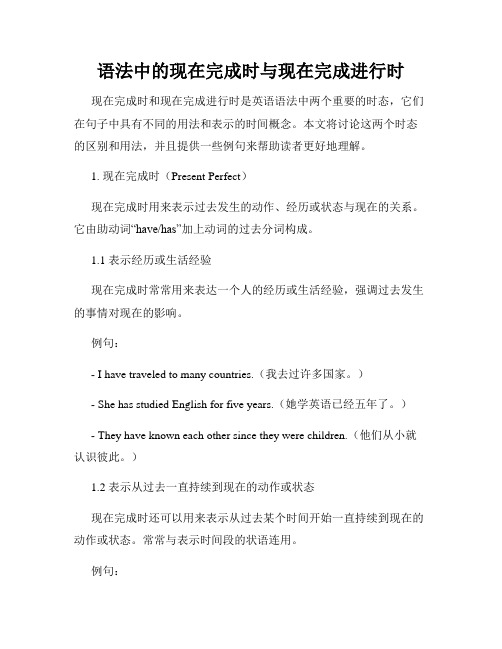
语法中的现在完成时与现在完成进行时现在完成时和现在完成进行时是英语语法中两个重要的时态,它们在句子中具有不同的用法和表示的时间概念。
本文将讨论这两个时态的区别和用法,并且提供一些例句来帮助读者更好地理解。
1. 现在完成时(Present Perfect)现在完成时用来表示过去发生的动作、经历或状态与现在的关系。
它由助动词“have/has”加上动词的过去分词构成。
1.1 表示经历或生活经验现在完成时常常用来表达一个人的经历或生活经验,强调过去发生的事情对现在的影响。
例句:- I have traveled to many countries.(我去过许多国家。
)- She has studied English for five years.(她学英语已经五年了。
)- They have known each other since they were children.(他们从小就认识彼此。
)1.2 表示从过去一直持续到现在的动作或状态现在完成时还可以用来表示从过去某个时间开始一直持续到现在的动作或状态。
常常与表示时间段的状语连用。
例句:- He has worked in this company for ten years.(他在这家公司工作了十年。
)- We have lived in this city since 2010.(我们从2010年开始就一直住在这个城市。
)1.3 表示刚刚完成的动作现在完成时还可以用来表示刚刚发生或完成的动作,并且与现在的情况或结果有关。
例句:- I have just finished my homework.(我刚刚完成了作业。
)- She has already left for the airport.(她已经去机场了。
)2. 现在完成进行时(Present Perfect Continuous)现在完成进行时用来表示从过去开始一直持续到现在的动作,并强调动作的持续性。
现在完成时和现在完成进行时的用法及区别习题

现在完成时和现在完成进行时的用法及区别习题现在完成时和现在完成进行时谈论的都是过去开始的、现在仍在进行的行动。
这意味着两种时态都可以用 how long 来回答正在进行的动作,然而,它们的关注点略有不同:▪现在完成时:▪1、与延续性和非延续性动词一起使用▪2、关注行动的结果▪3、谈论最近完成的与现在有关的行动或经历▪▪现在完成进行时▪1、仅与延续性动词一起使用▪2、强调动作的持续时间▪3、谈论正在进行的临时行动或新习惯▪一、选择正确的答案完成下面的句子1、_____your new car yet?a、Have you bought b、Have you been buying2、Our teacher _____more than a dozen exam papers up to now.a、has checked b、has been checking3、I _____to many counties so far.a、have travelled b、have been travelling4、I _____my key, I cannot find it.a、have lost have been losing5、It _____non-stop for more than an hour now.a、has rained b、has been raining6、Sara _____for you for a long time; where have you been?a、has been waiting b、has waited7、Brya _____Spanish for three years.a、has been learning b、has learned8、How long _____the piano? "Since I was 5."a、have you been playing b、have you played9、Mariamy _____ lost wallet.a、has found b、has been finding10、We _____you for ages.a、hasn't seen b、hasn't been seeing11、My dad _____in the same company for more than twenty years.a、has been working b、has worked12、My patience _____to anend.a、has come b、has been coming13、How long _____TV, your eyes look so red.a、have you been watching b、have you watched14、I _____for over eight hours now. I am extremely tired.a、have driven b、have been driving15、The jury _____a verdict after three hours.a、has reached b、has been reaching二、答案及解析1、Have you bought解析:yet 是现在完成时的信号词,因此这里选 Have you bought。
(word完整版)(新)现在完成时现在完成进行时
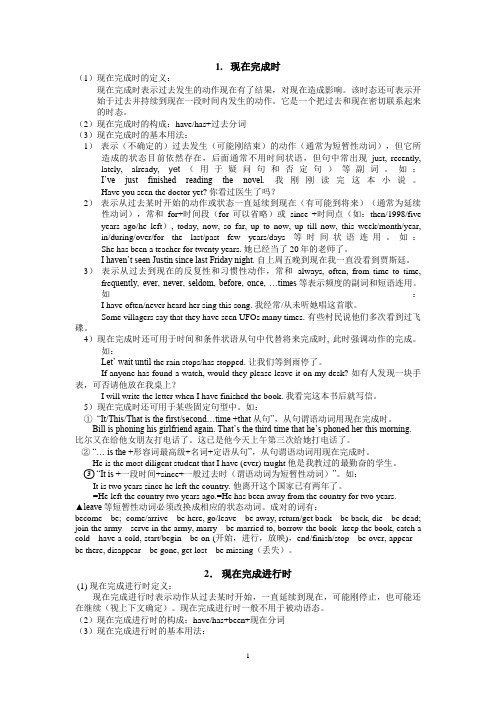
1.现在完成时(1)现在完成时的定义:现在完成时表示过去发生的动作现在有了结果,对现在造成影响。
该时态还可表示开始于过去并持续到现在一段时间内发生的动作。
它是一个把过去和现在密切联系起来的时态。
(2)现在完成时的构成:have/has+过去分词(3)现在完成时的基本用法:1)表示(不确定的)过去发生(可能刚结束)的动作(通常为短暂性动词),但它所造成的状态目前依然存在,后面通常不用时间状语,但句中常出现just, recently, lately, already, yet(用于疑问句和否定句)等副词。
如:I’ve just finished reading the novel. 我刚刚读完这本小说。
Have you seen the doctor yet? 你看过医生了吗?2)表示从过去某时开始的动作或状态一直延续到现在(有可能到将来)(通常为延续性动词),常和for+时间段(for可以省略)或since +时间点(如:then/1998/five years ago/he left), today, now, so far, up to now, up till now, this week/month/year, in/during/over/for the last/past few years/days等时间状语连用。
如:She has been a teacher for twenty years. 她已经当了20年的老师了。
I haven’t seen Justin since last Friday night. 自上周五晚到现在我一直没看到贾斯廷。
3)表示从过去到现在的反复性和习惯性动作,常和always, often, from time to time, fre quently, ever, never, seldom, before, once, …times等表示频度的副词和短语连用。
现在完成进行时和现在完成时辨析
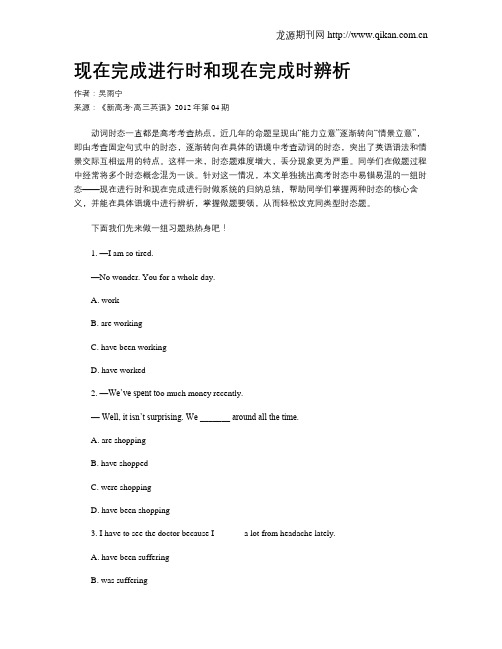
现在完成进行时和现在完成时辨析作者:吴雨宁来源:《新高考·高三英语》2012年第04期动词时态一直都是高考考查热点,近几年的命题呈现由“能力立意”逐渐转向“情景立意”,即由考查固定句式中的时态,逐渐转向在具体的语境中考查动词的时态,突出了英语语法和情景交际互相运用的特点。
这样一来,时态题难度增大,丢分现象更为严重。
同学们在做题过程中经常将多个时态概念混为一谈。
针对这一情况,本文单独挑出高考时态中易错易混的一组时态——现在进行时和现在完成进行时做系统的归纳总结,帮助同学们掌握两种时态的核心含义,并能在具体语境中进行辨析,掌握做题要领,从而轻松攻克同类型时态题。
下面我们先来做一组习题热热身吧!1. —I am so tired.—No wonder. You for a whole day.A. workB. are workingC. have been workingD. have worked2. —We’ve spent to o much money recently.—Well, it isn’t surprising. We _______ around all the time.A. are shoppingB. have shoppedC. were shoppingD. have been shopping3. I have to see the doctor because I ______ a lot from headache lately.A. have been sufferingB. was sufferingD. sufferKeys: C D A以上几个题同学们做对了吗?是不是对于两个时态有点混淆不清呢?下面我就针对两个时态的不同之处做个详尽的讲解。
一、现在完成进行时和现在完成时的核心含义1. 现在完成进行时的构成形式是have/has been doing sth.,一般译为“一直在做某事”。
现在完成时和现在完成进行时的区别优秀ppt课件
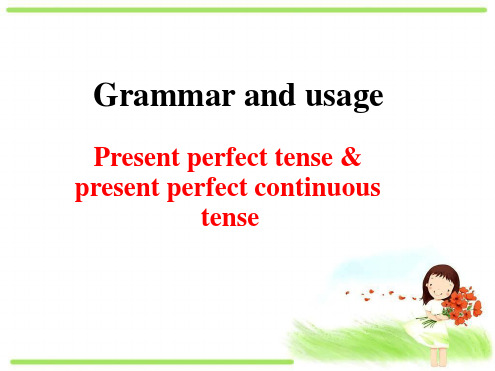
Practice one
Mr. Wolf
---Mr. Wolf, what have you been busy with these days? ---I _h_a_v_e_b_e_e_n__tr_y_i_n_g__ (try) to catch goats, but _h_a_v_e__ never __c_a_u_g_h__t (catch) a single one so far.
1. To talk about things that happened in the recent past but are connected with the present.
分析:过去的动作: got a new pair of glasses 对现在的影响: see more clearly.
总结:表示过去的动作对现在的影响
常跟already, yet 等连用
Watch and think
Usage 2
I have been to Paris twice.
2. To talk about unfinished repeated actions in a lifetime. 总结:表示反复的动作,经验
Grammar and usage
Present perfect tense & present perfect continuous
tense
Present perfect tense
? The monitor has changed his seat, so I can't find him.
I will be back soon!
? It's __b_e_e_n__ a long day without you my friend. And I'll tell you all about it when I see you again.
现在完成时及现在完成进行时讲解及练习现在完成进行时

现在完成时及现在完成进行时讲解及练习现在完成进行时1 定义:现在完成进行时表示动作从过去某一时间开始,一直延续到现在,可能还要继续下去。
2 现在完成进行时的构成:现在完成进行时是由“have/has+been+动词的现在分词”构成have/has + been+现在分词单数复数I havebeen + doing Wehave been + doing YouYou have TheyHe/She/It has3 现在完成进行时的基本句型肯定式I/We have been working.疑问式Have you been working?简略回答Yes,I/we have. No,I/we haven't.肯定式He/She/It has been working.疑问式Has he/she/it been working?简略回答Yes,he/she/it has. No,he/she/it hasn't.4现在完成时的用法1)在强调指出动作还未结束,还要继续下去。
如:I've been reading this book for two hours,but I haven't finished it. 这本书我已读了两个小时了,但我还没读完。
I've read this book.我已读完这本书了。
2)强调动作延续时间的长久或带感情色彩。
She has always been working like that.她一贯是这样工作的。
3)现在完成进行时也可表示现在以前这段时间反复发生的事情。
We've been seeing quite a lot of each other recently.最近我们经常见面。
5 现在完成时和现在完成进行时的区别1) 现在完成时强调动作的完成,而现在完成进行时强调动作的延续,因此,表示动作的完成,只能用现在完成时,而不能用现在完成进行时。
现在完成进行时和现在完成时辨析
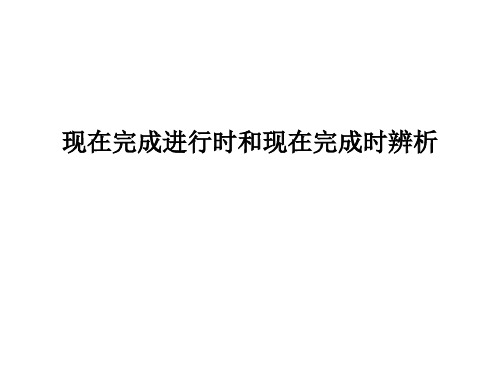
• 所谓两者在“这点上的吻合”,是指其反复性 而言,绝无合二而一的意思.现在完成进行时 表示明显延续、毫无间断的动作过程,如涉及 反复的次数或所完成的事物的具体数字时,就 不能用现在完成进行时态,而应改用现在完成 时:
• *I've been reading this poem five times this morning.
• I don't feel like going out this evening. I've been working in
the garde天的活.
• I've worked in the garden all day. I'm quite tired, • 我在园子里干了一天,累极了.
• I have been reading David Copperfield. • 我一直在读《大卫·科波菲尔》一书.(未读完) • I have read David Copperfield. • 我读过《大卫·科波菲尔》一书.(已读完) • Historic changes have been taking place all over the world. • 全世界不断发生历史性的变革.(尚未结束) • Historic changes have taken place all over the world. • 全世界已经发生了历史性的变革.(已经结束)
2. 确定性和不确定性
• 现在完成进行时和现在完成时的“已完成”用法一样,也 可以表示已经完成的动作.但是,它着重于动作的确定性, 而现在完成对则强调动作的不确定性,因而前者可以作为 解释某一事件的借口或理由,而后者只是对于动作后果的 客观的一般性叙述:
• Please excuse my dirty clothes. I’ve been cleaning out the garden shed.
新概念英语二册---现在完成进行时与现在完成时的辨析

一、现在完成时的复习与升华
• 定义: • 1.过去发生,因果影响 • You ____your turn so you'll have to wait. • A. will miss B. have missed C. are missing D. missed • I came in, found my sister staring at me and____ at her wildly • A. wave B. waved C. have waved D. had waved • Look at that little boy wandering about. Perhaps he____ his
• 2.始于过去,现在进行 • 标志词:since, for, how long • It has been raining for 2 hours since two hours ago. • =it began raining two hours ago+ It is still raining. • I have read a book (如何翻译? )
Have been doing 和have done 的细微差别 (“了”与“着”的区别)
• My hands are very dirty. I have been repairing the car. (修车来着) • The car is OK again. I have repaired it. (修好了)
• 必考句型: It is the first time that sb have done
• 某人到今天为止第一次做某事
• 1. ____you ____him around the museum yet? • Yes. We had a great time there. (江苏卷) • A. Have; shown B. Do; show C. Had; shown D. Did; show • 2. The unemployment rate in this district____ from 6% to 5% in the
完成进行时与完成时ppt课件

I think you are right. 我认为你是对的。
She’s thinking about the problem. 她正在思考那个问题。
(2) 常见的时间状语: at this time, at this moment
Exercise II
1. Hurry up, or we ________ (miss) the plane. 2. Do you know the earth _______ (go) round
Exercise I(单项选择)
1. Even though they ___ for twenty years, the two neighbors do not get on well with each other.
A. have been lived side by side
B. had been living side by side C. have been side by side living
at the end of next semester. 如:There will be a meeting next month.
(2)常用”be going to+动词原形”的结构表示 主语的主观想法或打算,如:
We’re going to have a trip in Hawaii.
进行时的用法
将来
过去 将来
一般将来时
将来完成时
将来进行时
I shall/will do I shall/will have I shall/will be
done
doing
一般过去将来 时
过去将来 完成时
一般现在时与现在完成进行时的区别

一般现在时与现在完成进行时的区别一般现在时和现在完成进行时都是英语中常用的时态,但它们在用法和表达上有着不同的特点。
本文将探讨一般现在时和现在完成进行时的区别。
一、一般现在时的用法一般现在时表示目前的状态、经常性的行为或普遍真理。
下面是一些一般现在时的例句:1. She goes to school every day.(她每天上学。
)2. I live in London.(我住在伦敦。
)3. The sun rises in the east.(太阳从东方升起。
)从以上例句可以看出,一般现在时用于表示经常性的行为或普遍真理,不涉及时间的限定,强调的是动作的经常性或客观的事实。
二、现在完成进行时的用法现在完成进行时表示动作开始于过去,一直延续到现在,或刚刚结束。
它强调的是过去开始的动作对现在的影响或结果。
下面是一些现在完成进行时的例句:1. I have been studying English for two hours.(我已经学习英语两个小时了。
)2. She has been waiting for the bus since morning.(她从早上就一直在等公交车。
)3. They have been working on this project since last month.(他们从上个月开始就一直在做这个项目。
)从以上例句可以看出,现在完成进行时用于表示过去开始的动作延续到现在,强调的是过去到现在的时间段内的持续性动作。
三、区别总结一般现在时和现在完成进行时的区别可以从以下几个方面来总结:1. 表达的时间段不同:- 一般现在时没有明确的时间段限制,用于表示经常性的行为、现实状态或普遍真理。
- 现在完成进行时强调的是过去到现在的时间段内的持续性动作。
2. 对动作的强调不同:- 一般现在时强调动作的经常性或客观事实。
- 现在完成进行时强调过去开始的动作对现在的影响或结果。
现在完成时和现在完成进行时的比较

现在完成时和现在完成进行时的比较现在完成时和现在完成进行时的比较1)这两个时态的主要差别是,现在完成时表示动作业已完成,而完成进行时却不一定如此:I’ve made a cake. 我做了一个蛋糕。
(已做好)I’ve been making a cake. 我一直在做一个蛋糕。
(不一定做好了)She’s painted a picture. 她画了一幅画。
(已画好)She’s been painting a picture. 她在画一幅画。
(可能还没画好)They’ve built a bridge. 他们建了一座桥。
(已建好) They’ve been building a bridge. 他们一直在建一座桥。
(可能还在建)He’s written a novel. 他写了一部小说。
(已完成)He’s been writing a novel. 他在写一部小说。
(可能尚未完成) 2)许多静态动词都只能用于完成时而不能用于完成进行时:I’ve known that for a long time. 这事我已经知道很久了。
The strike has lasted six months. 这次罢工已经持续了6个月。
Nobody has seen him since last week. 从上周起就没人见到过他。
We’ve had terrible weather for nearly two weeks. 几乎有两星期天气都很恶劣。
They’ve owned the house for many years. 这房子他们已经拥有许多年了。
I’ve always thought you’re right. 我一向认为你是对的。
但当意思发生转变时也可能用于完成进行时:I’ve been thinking of doing so for a long time. 我好久以来一直想这样做。
Which judge has been hearing the case? 哪位法官在审这个案子?She has been having a tooth out. 她在拔牙。
现在完成时和现在完成进行时的区别PPT教案

现在完成时:(have/ has + done) • —Where’s Lucy? I can’t find her.
—She has gone to Africa to be a volunteer. • China has developed rapidly since the reform
第7页/共12页
考点小结
➢ 现在完成时(have/ has + done)
1. 表示过去发生的某一动作对现在 造成的影响
或结果。 2. 表示过去已经开始,持续到现在
的动作或状态。 3. 表示人曾有过第8或页/共到12页 目前为止从未
有过的经历。
时间标志
1. already, never, ever, just, over 放在句中 2. yet(否/ 疑尾), before 放在句尾 3. up to now = so far 4. 次数:twice, the third time… 5. in/ during/ over the last/ past few years… 6. since + 时间点 7. for + 时间段 8. It is the first time that从句(从句谓语 用have/has done)
第2页/共12页
改错
1. The famous writer finished only one new book in the past two years. 2. They have gone to the Summer Palace three times.
第3页/共12页
完成句子
1. The play __________________ (已经 开始5分钟了). You are a little late.
- 1、下载文档前请自行甄别文档内容的完整性,平台不提供额外的编辑、内容补充、找答案等附加服务。
- 2、"仅部分预览"的文档,不可在线预览部分如存在完整性等问题,可反馈申请退款(可完整预览的文档不适用该条件!)。
- 3、如文档侵犯您的权益,请联系客服反馈,我们会尽快为您处理(人工客服工作时间:9:00-18:30)。
现在完成进行时的升华
无进行时的动词
不能进行的动词: 1.状态动词 2. 感官,状态系动词 3. 点动词
1. 状态动词: 1)爱与恨 love, hate, like, care, respect, please, prefer, Now I like English g . 2)有与无 have, , belong g to, , consist of, , contain, , lack, , include, , involve The house was my uncle’s 3 years ago. But now It belongs to me 3)思维 understand, know, forget, remember, believe, want, mind, agree, wish, recognize, g , mean, , need Now I realize the importance of English 3
Excuse me, , Marcia, , a reporter p from Vanity y Fair ____all day. y Could y you speak to her now? A. p phones B. has p phoned C. has been p phoning g D. p phoned
The house has been belonging g g to me for 20 years y I have been knowing Mr. Smith for 5 years 解决办法:用have done代替have been doing (重庆29) The palace caught fire three times in the last century, and little of the original g building g _______now. _______ A. remains B. is remained C. is remaining D. has been remaining
I _____ the book you lent me, me so you can have it back now A. have been reading B. have read C. read
It rained yesterday (下完没?) It has rained. So I have to stay at home (下完没?) It has been raining since 10(下完没?)
现在完成进行时与现在完成时的辨析
现在完成时的复习与升华 定义(一) 8字箴言:过去发生;因果影响 何为因果 You _____ your turn so you’ll have to wait. A. will miss B. have missed C. are missing
定义(二):谈论至今经历 提示词:so far, by now, up to/till now; as yet;to date; before (now), over/in the past three days ;ever,never, twice; 必考句型 考句型:It is the first time that sb have done 1 — ______ you ______ him around the museum yet? 1. — Yes. We had a great time there. (江苏卷) A. Have; ve; shown s ow B. Do; o; show s ow C C. Had; d; s shown ow D. Did; d; s show ow 2. The unemployment rate in this district_______ from 6% to 5% in the past two wo ye years. s. (上海卷) A. has fallen B. had fallen C. is falling D. was falling 3. (山东卷30)Up to now, the program ________ thousands of children who would otherwise have died. A. would save B. saves C. had saved D. has saved
改错 I have been liking this cartoon for 10 years I have been having g the book since 1998
2. 状态系动词与感官系动词 be, remain; keep, stay, maintain; seem, appear, prove look, sound, taste, smell, feel I have been keeping the book for 3 years
D. missed
I came i in, found f d my sister i t staring t i at t me and d ____ at th her wildly ildl A. wave B. waved C. have waved D. had waved Look at that little boy wandering aabout. Perhaps he _____ his mother. A. will lose B. is losing C. had lost D. has lost
基本定义(2)始于过去;现在进行 标志词:since; for; how long It has been raining for 2 hours/since tow hours ago =it began g raining g two hours ago+ g It is still raining g I have read a book (如何翻译? 何翻译 ) I have read a book for 2 hours (对不对?) I have been reading a book for 2 hours
现在完成进行时的定义与辨析 have been doing
请用have been doing造句 1J h l 1.John looks k sunburnt. b Y ask: You k (you/ ( / sit i in i the h sun) ) 2. You have just arrived to meet a friend who is waiting for you. You ask: (you/wait/long?) 3. You meet a friend in the street. His face and hands are very dirty. You ask: ( what/you/do) h t/ /d )
定义(1):始于过去,刚刚结束 Is it raining? No, but the ground is wet. I h It has b been raining i i You are out of breath. Have you been running? Whay are your clotthes so dirty? What have you been doing?
1
Have been doing与have done的细微差别 (“了”与“着”的区别) My hands are very dirty. I have been repairing the car The car is OK again. I have repaired it. H Have been b doing d i 强调动作; have h d done 结果影响 It’as nice It’ i to t see you again. i What Wh t have h you been b d doing i since i we last l t met? t? Where is the book I gave you? What have you done with it Where have you been? Have you been playing tennis? Have you ever played tennis?
The p phone rang/has g rung g The phone has been ringing 学生们一直在准备着考试。 学生们为考试作了准备。
---why, Jack, you look so tired! ---well, I ___the house and I must finish the work tomorrow. A. was painting B. will be painting C. have p painted D. have been p painting g I’m tired out. I ____all afternoon and I don’t seem to have finished anything y g A . shopped B. have shopped C. had shopped D. have been shopping
合成句子: 1. we started waiting g for the bus 20 minutes ago. g We are still waiting g now. We _____________________________________________for 20 minutes. 2. I started Spanish classes in December. I’m still learning it now. ___________________________________________________________ 3. Ann began looking for a job 6 months ago. She’s still looking now ___________________________________________________________ 4. Years ago you started writing to a penfriend. You still write to each other regularly now We have been writing to each other regularly for years. 2
